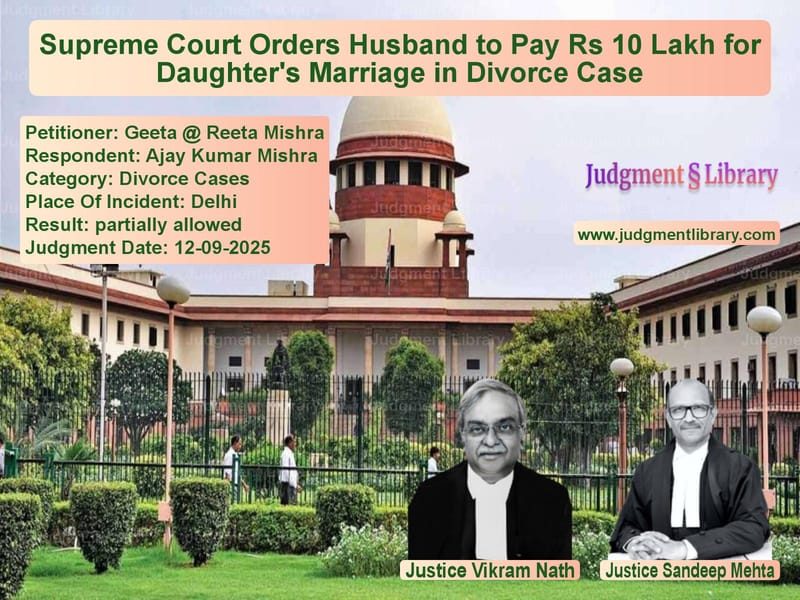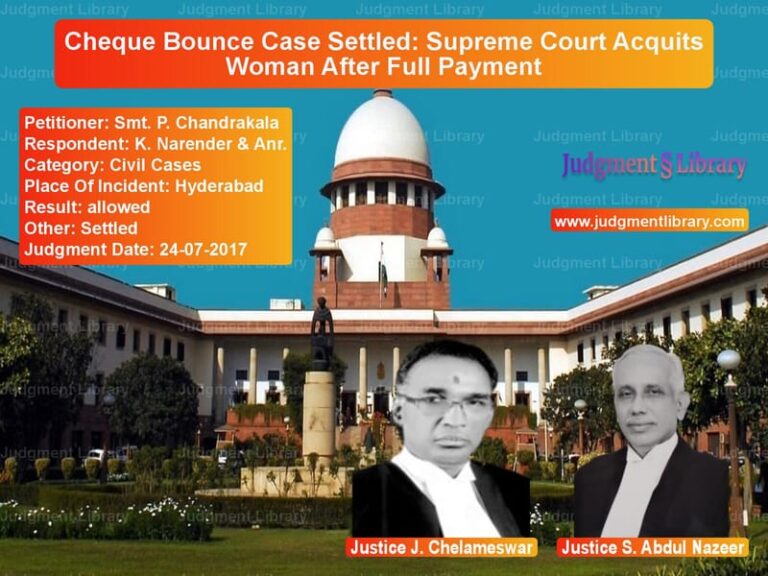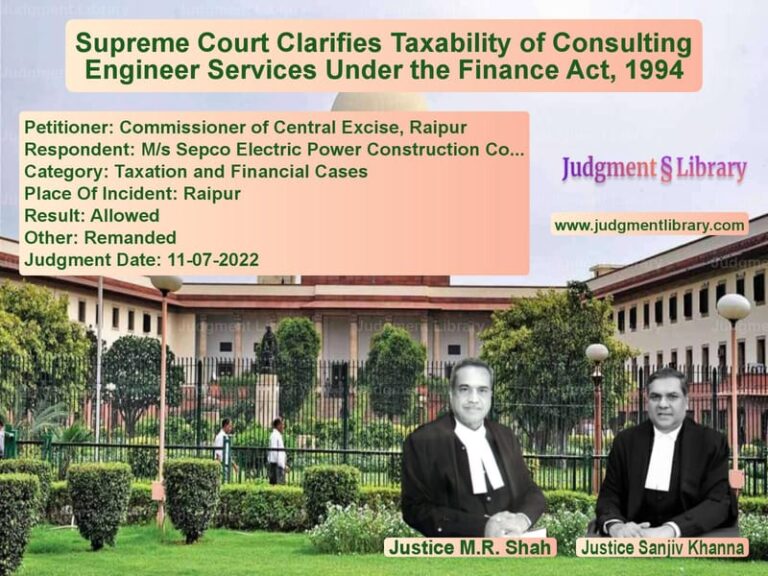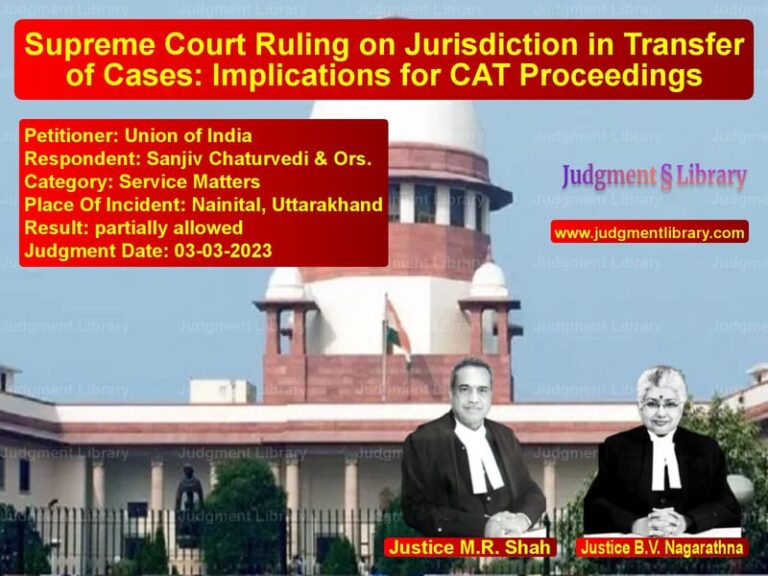Supreme Court Orders Husband to Pay Rs 10 Lakh for Daughter’s Marriage in Divorce Case
In a significant judgment that balances the finality of divorce with parental responsibilities, the Supreme Court has directed a husband to contribute Rs 10 lakh towards his daughter’s marriage expenses while upholding the divorce decree granted to the couple. The case involving Geeta @ Reeta Mishra and Ajay Kumar Mishra represents a typical yet complex family dispute that spanned over 16 years, touching upon issues of cruelty, domestic violence, and parental obligations beyond marital breakdown.
The Marital Background and Legal Battles
The parties were married on May 6, 1996, and had two children from the marriage – a daughter born in 1997 and a son born in 1999. What began as a promising marital relationship soon turned sour, leading to multiple legal proceedings that would span more than a decade and a half. The respondent-husband filed a divorce petition in March 2009 under Section 13(1)(ia) of the Hindu Marriage Act, 1955, on the ground of cruelty. The husband alleged various instances of mental cruelty by the wife, while the wife countered that she herself had been subjected to mental and physical cruelty.
The legal battles intensified when the appellant-wife filed a complaint under Section 12 of the Protection of Women from Domestic Violence Act, 2005 against the respondent-husband and his family members. In these DV Act proceedings, the Mahila Court initially directed the husband to pay maintenance of Rs.6,300 per month, which was later enhanced to Rs.7,500 per month. The case took an unusual turn when the respondent-husband moved an application in the DV Act proceedings seeking DNA testing of both children, claiming they were not his. This application, however, did not succeed in changing the course of the proceedings.
The Divorce Decree and Subsequent Appeals
The Family Court, vide order dated September 20, 2019, granted divorce on the ground of cruelty. Meanwhile, the main complaint under the DV Act was dismissed, but on appeal, the appellate Court held the respondent-husband guilty of domestic violence and directed him to pay Rs.2,00,000 to the appellant-wife. This amount was significantly enhanced to Rs.7,00,000 by the High Court on November 9, 2022 in a revision filed by the appellant-wife. The husband’s Special Leave Petition challenging this order was dismissed by the Supreme Court on March 27, 2023.
The appellant-wife challenged the divorce decree before the High Court of Delhi in MAT.APP.(F.C.) No.20 of 2020. The High Court, in its impugned judgment, affirmed the decree of divorce. The court observed that the parties had been in constant acrimony since the inception of their marriage, leading the wife to make repeated complaints to the police. The High Court held that lodging false complaints amounted to cruelty. It also noted that the parties have lived separately since around 2009, with no attempt at reconciliation. Aggrieved by this decision, the appellant-wife approached the Supreme Court.
The Supreme Court Proceedings
Before the Supreme Court, the appellant-wife took a reasonable approach by confining her claim to seeking an amount of Rs.10,00,000 towards the marriage expenses of their daughter. The appellant-wife submitted that the respondent-husband earns from running an aquarium shop, rental income from his properties, and contributions from his father. The respondent denied these claims and stated that he has no earnings whatsoever.
The Supreme Court made several important observations in its judgment. The bench noted that “It is evident that the marital relationship between the parties has ceased to exist in substance. Even an attempt at mediation before us proved unsuccessful.” Regarding the limited nature of the appeal, the court stated: “Since the appeals are pressed only to the limited extent of payment of a certain amount, and in view of the long separation and irretrievable breakdown of the marriage, we find no reason to interfere with the decree of divorce granted by the Family Court and affirmed by the High Court.”
The Court’s Reasoning on Parental Responsibility
The Supreme Court addressed the conflicting stands on the respondent’s income by stating: “As regards the issue of contribution for the daughter’s marriage, the parties have taken conflicting stands on the respondent’s income. Nevertheless, on our consideration of the record and submissions, we are satisfied that the respondent is capable of making provision for his daughter’s marriage.”
The court acknowledged the challenging circumstances faced by the appellant-wife, observing: “It is clear that the litigation between the parties has been prolonged and acrimonious. Yet, the appellant-wife has been reasonable in limiting her claim before us. She has raised and supported both children largely on her own.”
In one of the most significant portions of the judgment, the Supreme Court emphasized: “It is a father’s duty to provide for his children, and meeting the marriage expenses of his daughter is a modest obligation. We are of the considered view that the respondent can and should contribute Rs.10,00,000/- (Rupees Ten Lakhs only) for this purpose as meeting the reasonable expenses of his daughter’s marriage is a natural extension of his duty as a parent, irrespective of differences with the spouse.”
The Final Judgment and Directions
The Supreme Court disposed of the appeals with specific directions: “Accordingly, the respondent-husband is directed to pay an amount of Rs.10,00,000/- (Rupees Ten Lakhs only) to the appellant-wife towards the marriage expenses of their daughter on or before 15th October 2025. In case of default, the Registry shall revive these appeals for further consideration and appropriate orders.”
The court also directed that “The appellant-wife shall provide her bank account details to the respondent-husband to facilitate payment.” Finally, the court affirmed that “The decree of divorce granted by the Trial Court and affirmed by the High Court stands affirmed subject to the direction contained in paragraph 10 above.”
Broader Implications of the Judgment
This judgment is significant for several reasons. First, it recognizes that while marital relationships may break down irretrievably, parental responsibilities continue beyond divorce. The court has drawn a clear distinction between the husband-wife relationship and the father-child relationship, emphasizing that the latter cannot be extinguished by the dissolution of marriage.
Second, the judgment acknowledges the practical realities faced by women in long-drawn legal battles. The court took note of the fact that the appellant-wife had raised and supported both children largely on her own, indicating an understanding of the financial challenges faced by single mothers.
Third, the court adopted a pragmatic approach in dealing with conflicting claims about the husband’s income. Rather than getting bogged down in detailed income assessment, the court used its discretion to determine that the husband had the capacity to contribute to his daughter’s marriage expenses.
The judgment also sets a precedent for dealing with cases where parties have been separated for long periods. The court recognized that after years of separation and multiple legal battles, attempting to salvage the marriage would be futile, but ensuring that children’s interests are protected remains paramount.
This case serves as an important reminder that family disputes, particularly those involving children, require a balanced approach that considers both legal principles and human realities. The Supreme Court’s decision to uphold the divorce while ensuring the father’s financial responsibility towards his daughter’s future represents this balanced approach, providing closure to the marital relationship while safeguarding the children’s interests.
Petitioner Name: Geeta @ Reeta Mishra.Respondent Name: Ajay Kumar Mishra.Judgment By: Justice Vikram Nath, Justice Sandeep Mehta.Place Of Incident: Delhi.Judgment Date: 12-09-2025.Result: partially allowed.
Don’t miss out on the full details! Download the complete judgment in PDF format below and gain valuable insights instantly!
Download Judgment: geeta-@-reeta-mishra-vs-ajay-kumar-mishra-supreme-court-of-india-judgment-dated-12-09-2025.pdf
Directly Download Judgment: Directly download this Judgment
See all petitions in Alimony and Maintenance
See all petitions in Child Custody
See all petitions in Domestic Violence
See all petitions in Property Division in Divorce Cases
See all petitions in Judgment by Vikram Nath
See all petitions in Judgment by Sandeep Mehta
See all petitions in partially allowed
See all petitions in supreme court of India judgments September 2025
See all petitions in 2025 judgments
See all posts in Divorce Cases Category
See all allowed petitions in Divorce Cases Category
See all Dismissed petitions in Divorce Cases Category
See all partially allowed petitions in Divorce Cases Category






